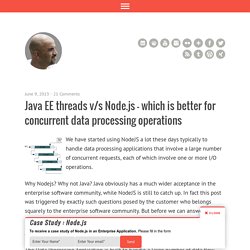

An Absolute Beginner's Guide to Node.js. There's no shortage of Node.js tutorials out there, but most of them cover specific use cases or topics that only apply when you've already got Node up and running.

I see comments every once and awhile that sound something like, "I've downloaded Node, now what? " This tutorial answers that question and explains how to get started from the very beginning. How do I get started with Node.js. How the single threaded non blocking IO model works in Node.js. What Makes Node.js Faster Than Java? Every few weeks someone posts a Java vs Node benchmark, like PayPal’s or Joey Whelan’s.

As one of maintainers of Node core and contributors to many npm modules, StrongLoop is happy to see Node winning lately. Everyone knows benchmarks are a specific measurement and don’t account for all cases. How node.js server is better than thread based server. Hardware - Multithreading: What is the point of more threads than cores? Java EE threads v/s Node.js - which is better for concurrent data processing operations. We have started using NodeJS a lot these days typically to handle data processing applications that involve a large number of concurrent requests, each of which involve one or more I/O operations.

Why Nodejs? Why not Java? Java obviously has a much wider acceptance in the enterprise software community, while NodeJS is still to catch up. In fact this post was triggered by exactly such questions posed by the customer who belongs squarely to the enterprise software community. But before we can answer this question, we must understand what the target application is trying to do. What does the Data Processing Application do? The Data Processing Application is built to handle a large number of data flow processes that involve significant amount of I/O operations. Each process involves making calls to one or more database engines using network I/O. The Data Processing Application needs to execute a large number of concurrent API requests, each involving multiple network I/O operations.
Conclusion. What is Node.js? Node.js is an event-driven, non-blocking I/O model.

It is a server side JavaScript environment that is based on the V8 JavaScript Engine developed by Google.The V8 JavaScript Engine allows Chrome to run Javascript code much faster. It is able to do this by compiling the JavaScript directly into native machine code. Other browsers interpret JavaScript, or execute it as byte code. Node is specifically designed for building fast and efficient real time, data intensive, scalable asynchronous network applications. What are some benefits for using JavaScript and node.js for server side programming? Both the front and back end of the a web application can be developed in the same languageminimize developer learning curvesminimize developer context switches. Understanding node.js. Node.js обычно вызывал у людей, которым я о нём рассказывал, две различные реакции.

В основном они воспринимали его «как есть», однако многие были сбиты с толку. Если вы относитесь ко второй группе, я попробую объяснить, что же такое Node.js: Это инструмент командной строки. Вы скачиваете архив, компилируете и устанавливаете его.Это позволит вам выполнять программы на JavaScript, набрав 'node my_app.js' в терминале.JavaScript выполняется движком V8 (тем самым, благодаря которому так быстро работает Google Chrome).Node.js предоставляет API для доступа к сети и файловой системе из JavaScript. «Но я могу сделать то, что мне необходимо, с помощью Python, Ruby, Java, PHP,… !». Да, это я уже слышал. «Ближе к делу!» Understanding the node.js event loop. So the largest waste with current programming technologies comes from waiting for I/O to complete.

There are several ways in which one can deal with the performance impact (from Sam Rushing): The second basis thesis is that thread-per-connection is memory-expensive: [e.g. that graph everyone showns about Apache sucking up memory compared to Nginx] Apache is multithreaded: it spawns a thread per request (or process, it depends on the conf). You can see how that overhead eats up memory as the number of concurrent connections increases and more threads are needed to serve multiple simulataneous clients.
Nginx and Node.js are not multithreaded, because threads and processes carry a heavy memory cost. There is no way of making code run in parallel within a single request. If you do that in one request, other requests can be processed just fine while the database is running it's sleep. Of course, on the backend, there are threads and processes for DB access and process execution. Что такое Node.JS? Почему Node.JS?